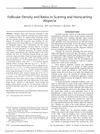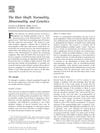 December 2024 in “Tropical Journal of Natural Product Research”
December 2024 in “Tropical Journal of Natural Product Research” CTUMP's Herb shampoo promotes faster and denser hair growth.
 50 citations,
December 2010 in “Dermatologic Surgery”
50 citations,
December 2010 in “Dermatologic Surgery” Laser treatment can stimulate hair growth for male pattern hair loss.
 3 citations,
January 2019 in “Journal of Cutaneous and Aesthetic Surgery”
3 citations,
January 2019 in “Journal of Cutaneous and Aesthetic Surgery” Scalp and beard hair survive best in hair transplants, but the procedure needs high skill and takes longer.
 1 citations,
January 2023 in “Journal of Clinical Medicine”
1 citations,
January 2023 in “Journal of Clinical Medicine” A new hair restoration technology was found to effectively increase hair thickness, density, and growth, while reducing hair loss and improving scalp health, with no side effects.
 42 citations,
March 2014 in “European Journal of Pharmacology”
42 citations,
March 2014 in “European Journal of Pharmacology” Ginsenoside F2 from ginseng may increase hair growth better than standard treatments by affecting cell growth signals.
 146 citations,
January 2004 in “Hormones”
146 citations,
January 2004 in “Hormones” Human skin acts like a hormone-producing organ, making and managing various hormones important for skin and hair health.
 19 citations,
February 2013 in “The American Journal of Dermatopathology”
19 citations,
February 2013 in “The American Journal of Dermatopathology” Nonscarring alopecia has higher hair density than scarring alopecia, and hair density can help diagnose the type of alopecia.
 63 citations,
March 1995 in “International Journal of Dermatology”
63 citations,
March 1995 in “International Journal of Dermatology” Some drugs can cause hair loss, and stopping these drugs often leads to hair regrowth.
11 citations,
January 2015 in “PubMed” A specific laser treatment can promote hair growth in mice by increasing certain protein levels.
 11 citations,
March 2001 in “Clinics in Dermatology”
11 citations,
March 2001 in “Clinics in Dermatology” Hair microscopy is useful for diagnosing hair disorders, but clear definitions are needed for accurate genetic analysis.
 24 citations,
July 1987 in “Dermatologic Clinics”
24 citations,
July 1987 in “Dermatologic Clinics” Systemic diseases can cause hair loss, which is often reversible with treatment.
 132 citations,
October 1995 in “Journal of the American Academy of Dermatology”
132 citations,
October 1995 in “Journal of the American Academy of Dermatology” Electrolysis is effective for permanent hair removal, but technique is key to avoid scarring, and sometimes hormonal treatment is needed for women with hirsutism.
 13 citations,
March 2020 in “Genes”
13 citations,
March 2020 in “Genes” Disrupting the FGF5 gene in rabbits leads to longer hair by extending the hair growth phase.
 20 citations,
September 1978 in “International Journal of Dermatology”
20 citations,
September 1978 in “International Journal of Dermatology” Hair growth is influenced by factors like genetics and nutrition, and more research is needed to understand hair loss and growth mechanisms.
 January 2019 in “Springer eBooks”
January 2019 in “Springer eBooks” Some chemicals and drugs can cause hair loss, which usually grows back after stopping the treatment.
 2 citations,
December 2017 in “Bangladesh Journal of Pharmacology”
2 citations,
December 2017 in “Bangladesh Journal of Pharmacology” Black seed oil significantly protects against hair loss from chemotherapy.
 1 citations,
October 2015 in “CRC Press eBooks”
1 citations,
October 2015 in “CRC Press eBooks” Nutricosmetics with active ingredients can help with hair loss and improve hair growth.
October 2023 in “Nutrients” Millet and wheat extracts may improve hair health and promote growth.
 397 citations,
February 2004 in “British Journal of Dermatology”
397 citations,
February 2004 in “British Journal of Dermatology” Minoxidil boosts hair growth by opening potassium channels and increasing cell activity.
 September 2003 in “Current Paediatrics”
September 2003 in “Current Paediatrics” The document concludes that accurate diagnosis and understanding the type of hair disorder are crucial for treating hair loss in children.
134 citations,
July 2020 in “Experimental dermatology” Hair follicles are normally protected from the immune system, but when this protection fails, it can cause hair loss in alopecia areata.
 34 citations,
February 2012 in “Journal of Cutaneous Pathology”
34 citations,
February 2012 in “Journal of Cutaneous Pathology” The research found specific signs to diagnose alopecia areata incognito and noted patients generally regrow hair after steroid treatment.
 26 citations,
March 2015 in “Phytotherapy Research”
26 citations,
March 2015 in “Phytotherapy Research” Forsythiaside-A, a natural substance, can protect against hair loss and is more effective than current treatments, potentially making it a good option for hair loss treatment.
 33 citations,
December 2008 in “Journal of Dermatology”
33 citations,
December 2008 in “Journal of Dermatology” Adenosine lotion improves hair growth and thickness in women with hair loss.
 July 2024 in “Experimental Dermatology”
July 2024 in “Experimental Dermatology” AP collagen peptides help hair grow and improve hair health.
12 citations,
January 2020 in “Indian Dermatology Online Journal” Female pattern hair loss has multiple causes and treatments, with new therapies showing promise.
July 2002 in “Journal of Cosmetic Dermatology” Laser and Eflornithine are more effective for hair removal than traditional methods.
 42 citations,
April 2011 in “Annals of Pharmacotherapy”
42 citations,
April 2011 in “Annals of Pharmacotherapy” Flutamide effectively treats female pattern hair loss with low doses showing good liver tolerance.
January 2020 in “Journal of translational science”  9 citations,
June 2014 in “British Journal of Dermatology”
9 citations,
June 2014 in “British Journal of Dermatology” The study found that balding scalps have more thin hairs and larger oil glands, which might contribute to skin conditions related to hair loss.
























